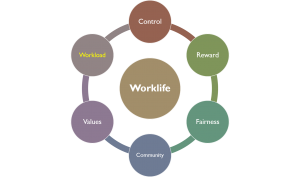Steps You Can Take to Identify (and fix) Burn-out
Is work getting you down? Are you an essential worker? Has your workplace closed or are you working from home? Dealing with COVID-19, most of us are increasingly anxious, frustrated and fearful. Understandably we can feel anxiety and stress from following the news and updates during any crisis. When this is compounded with feeling burnt-out at your job it can be overwhelming. The World Health Organization (WHO) has recently determined workplace burn-out to be an official medical diagnosis. And, university researchers have developed various models to help explain and predict burnout so that individuals can identify coping strategies that fit their lifestyle.
First, let’s understand how we define burnout. The WHO says that “Burn-out is a syndrome conceptualized as resulting from chronic workplace stress that has not been successfully managed. It is characterized by three dimensions”:
- feelings of energy depletion or exhaustion;
- increased mental distance from one’s job, or feelings of negativism or cynicism related to one’s job; and
- reduced professional efficacy.
Many of us have either experienced someone battling burn-out or felt near the end of the rope ourselves.
Next, let’s look at a model that can predict and help you overcome burn-out. The Areas of Work life model (by Maslach and Leiter) identifies six areas where you could experience imbalances that lead to burnout.
- Workload- When your workload is too high it can lead to burn-out. Assess how you are managing your workload. Use time management skills such as delegation, planning and saying “no” to adapt your workload to your output. This can reduce stress about productivity.
- Control- Lack of perceived control can cause stress and burn-out. While we cannot always control our job functions, several things can help. Recognize that you have personal demands on your life and allow flexibility to take care of both work and life demands. Setting boundaries with your time, prioritizing important tasks, and communicating with your boss and co-workers will help you feel more in control of your work.
- Reward- If the “reward” for your work doesn’t match your effort it can cause feelings of burn-out. Thinking carefully about what rewards you require will help to overcome this. Maybe you need to take some vacation time, ask for a raise or promotion?
- Fairness- You will be much happier at work if you feel that you get treated fairly. If everyone plays by the same rules. If this is not happening, you can speak up to try to remedy the situation.
- Community- Poor personal dynamics at work can affect everyone in the workplace. Is it possible to improve your work relationships? Engaging and being a supportive team member can help you find satisfaction in your job. Words as simple as, “I appreciate your work on this”, “I really like how you did that.” Or, “Good to hear your voice.” These words when authentically spoken provide healthy dynamics for the workplace. During a crisis like COVID-19, we can all use a boost.
- Values- If your personal values and worldview are very different from your organizations it can lead to a lack of motivation. This may not be something that you can change. In that case you should think about how it affects you and act accordingly.
Reducing the risk of burn-out by building a toolbox takes courage. It’s courageous to admit to ourselves the level to which we might struggle. The good news is, once we take charge of the things that are causing burn-out, we reduce our anxiety and stress. For more quick readings on work, stress and Covid-19 follow these blogs:
https://blogs.ifas.ufl.edu/monroeco/2020/04/28/staying-motivated-at-work-and-in-crisis/
https://blogs.ifas.ufl.edu/monroeco/2020/05/06/everyone-has-their-own-normal/
Co-authored by:
Ramona Madhosingh-Hector, Regional Specialized Agent, Urban Sustainability UF/IFAS Extension Pinellas County
Carol Roberts, Community Resource Development Agent, St. Lucie County
Linda Seals, Regional Specialized Agent, Community Development, UF/IFAS Extension
Find us on Face Book!
 1
1

